Shinjuku Triad Society (1995)
Directed by: Takashi Miike
Written by: Ichirô Fujita
Starring: Kippei Shîna, Ren Ohsugi, Takeshi Caesar, Tomorowo Taguchi
AKA SHINJUKU KURO SHAKAI CHAINA MAFIA SENSO
Japan
ON DUAL FORMAT BLU-RAY AND DVD: 16TH JAN, from ARROW VIDEO in their BLACK SOCIETY TRILOGY SET
RUNNING TIME: 104 min
REVIEWED BY: Dr Lenera, Official HCF Critic
Tatsuhito Kuriya is a half-Chinese cop working in Tokyo’s yakuza-ridden district of Shinjuku. He’s in the Dragon’s Claw gang’s pocket, and is trying to bring down Wang Zhimin, a Taiwanese immigrant who has become the leader of a Chinese triad gang that’s trying to take over the area, and who is also the man behind some illegal importing and selling of organs. Kuriya is prepared to use foul means to achieve his goal, but his situation is complicated by his brother taking on the job of lawyer to Wang, and then Wang making the Yakuza a business offer they can’t refuse….
It’s kind of a shame that I suddenly begun to say to myself: “What the f***”? about three quarters of the way through Shinjuku Triad Society. Picture this. A man smashes a chair over a woman’s face which badly scars her, then later on slaps her about and rapes her from behind. Later, the woman finds the man, who has been badly beaten up, helps him to escape and even brings him to her house! She explains her unfathomable actions by saying that when the man raped her it was the first time that she’d had an orgasm while she wasn’t “high” and therefore needs to “save that dick”. It really is an astonishingly poor and even offensive example of writing from screenwriter Ichirô Fujita, especially in a film that for the most part adopts a fairly realistic approach to its story. O well. Its director Takashi Miike, a man who has made nearly 100 films for cinema and TV, is a filmmaker I’ve always wanted to explore more of, and fortunately this unashamedly sleazy, vicious first instalment in Miike’s gangster-orientated Black Society Trilogy, if not really a classic of the genre, is certainly good enough for me to look forward to watching the other two….well, ignoring what I just described above!
The opening words we hear, over a shot which is actually taken from near the end of the movie, are: “I know a love story that’s both sickening and sweet,that’s how love is”, and the words must be ironic because there isn’t really any love story whatsoever in the movie, or at least any kind of relationship that doesn’t involve somebody using somebody else. The first few minutes rather haphazardly cut together shots of events happening in several different places including bodies on the street, a police car driving, and a DJ scratching a record in a nightclub, though the film does soon settle down and we witness a meeting between a male prostitute named Zhou and a client whose liason is interrupted by a police raid. I should warn any readers right now that there’s a hell of a lot of homosexual fellatio going on in this movie, though it’s not explicit. Anyway, the leader of the raid Tatsuhito is trying to hunt down Triad leader Wang and shows just how determined he is in the way he treats female Chinese prostitute [only four of the characters in this film are actually named] after interrogating her, a moment which certainly shocked me as it was so unexpected [maybe Miike veterans wouldn’t be]. Throw in a brother of Tatsuhito who’s working for Wang, Chinese and Japanese gangs battling for the area, plus a spot of illegal organ trafficking, and you have quite a lot going on in a film with a fair bit of gunplay and brawling, and which is certainly fast paced, albeit not too fast paced that you can’t keep up with what’s going on. And of course you’re never more than ten minutes away from a sudden burst of extreme violence which, despite the camera’s tendancy to cut away, still tends to have the shock effect obviously intended.
On the surface not much of this sounds like anything new, and Miike does seem to have been influenced a bit, at least in this film, by certain early John Woo and Takeshi Kitano [Kuriya is really a close relative of his Violent Cop] efforts, and the emphasis on sleaze does result in a film where you may feel like washing your hands after watching it, but there is some interesting stuff going in it, such as the way Miike treats his two principal characters of Tatsuhito and Wang. They may on the surface be hero and villain but really neither one acts as protagonist or antagonist within the film. Wang is a sadistic, borderline psychopath. He can pluck out an eye with his hand, and is involved in the reprehensible business of illegal organ trafficking, yet he later attains a back story and even romantic inclinations which add a tragic air to the character. Both Tatsuhito, who is part Chinese and part Japanese, was treated as a member of a despised minority in Taiwan growing up and now struggles for acceptance in Japan, and Wang, who was forced to flee his native Taiwan after murdering his drug-addled father when he was 14 yrs old, have grown up with no sense of identity. It seems that we never really get to know Tatsuhito’s brother properly though, while the only really sympathetic characters in the film are probably Tatsuhito’s parents, but it’s certainly horribly fascinating watching these people. And at least Miike and Fujita don’t glamourise them; in no way do we come away from the movie thinking that crime pays.
Odd little bits and pieces are sometimes inserted to otherwise conventional scenes, like a gang meeting which finishes with Wang flashing the mostly elderly Triad bosses. Then there’s an unusual method of police interrogation which finishes when the person being questioned, a Chinese prostitute, only gives the police what they want when they threaten to stop her being sodomised. It’s certainly a scene in poor taste but poor taste, especially sex related and taboo bursting, seems to be something Miike is known for so I guess I’d better get used to it. By contrast there’s a rather sweet little moment when Tatsuhito is in Taiwan and a father and his two kids walk by singing a song which Tatsuhito remembers from his youth, whereupon he joins in. It’s almost out of place but welcome, and some single shot flashbacks show that this director can be subtle when he wants to be. None of this is especially great to look at; the film looks quite rough and there are some moments, even on the Blu-ray, where excessive darkness makes it hard to see much, but the rough and ready aesthetic provides a certain rawness which has its own merits, and real-time shots of the streets of Shinjuku and Taiwan seem to be incorporated into the fictional scenes without jarring at all.
Kippie Shiina comes across as a seedier version of Clint Eastwood in his role as Tatshihito, but it’s really Tomorrow Taguchi, despite having far fewer screen time, who really dominates. His Wang is a genuinely frightening character with really unnerving eyes which look like they’re penetrating into your soul. The young actor who plays Zhou [he’s not named and I couldn’t work out who played him?], a character who uses and is used by most people in the film, and who in a sense is the important person in it, also leaves an impression, chiefly of vulnerability. With a mediocre score and some clumsiness throughout, Miike’s first cinema feature [he’d previously just done TV and straight to video movies] has its obvious flaws but has something undoubtedly compelling about it and still leaves a distinct impression of the dark underworld that may exist right under our noses, and of the dregs and outcasts that populate it. And it does have a heart to it, just a tough and unsentimental one.
Rating: 









Even the usually excellent restoration work of Arrow Video can’t work wonders with the cheap and tatty look of Shinjuku Triad Society, but this is probably the best the film has looked. The image is very soft throughout but still has plentiful detail and showcases some interesting use of colour here and there. Rather than port over the commentary by Miike biographer Tom Mes from the old Region 1 DVD release, Arrow got him to do an all new track. Mes has a very laid back, almost soporific manner which means that the attention can be prone to wondering, but he certainly provides all the information and observations you could want, being especially good on linking this film to Miike’s others. Instead of the DVD’s Miike and editor Yasushi Shimamura interviews, Arrow have replaced it with a new interview with Miike which is impressively lengthy and covers a great deal from how he got started [he reckons if he hadn’t been asked to replace another director on the film he’d never have been able to become a filmmaker] to Kippei Shîna’s propensity for arguing with others on set. Interesting how he says he never changes the scripts he’s given to film either. More than anything else, he comes across as a guy who just loves making movies.
SPECIAL EDITION CONTENTS:
*High Definition digital transfer
*Original uncompressed stereo audio
*Optional English subtitles
*New interview with director Takashi Miike
*New audio commentary by Miike biographer Tom Mes
*Original theatrical trailer
*Reversible sleeve featuring original and newly commissioned artwork by Chris Malbon
FIRST PRESSING ONLY: Illustrated collector’s booklet featuring new writing on the film

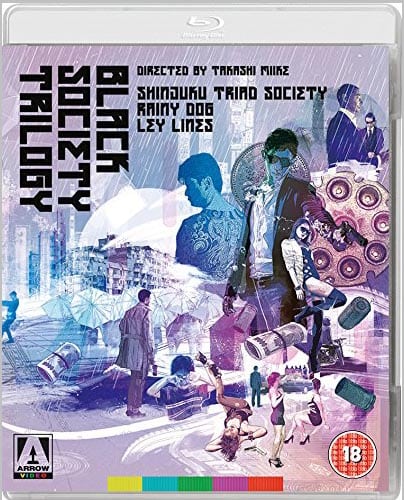
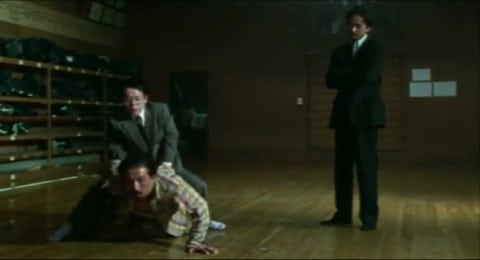
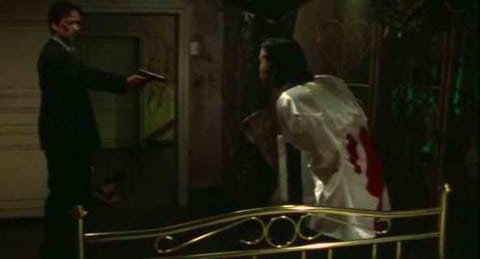


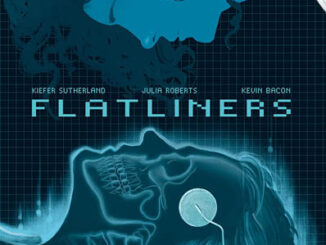
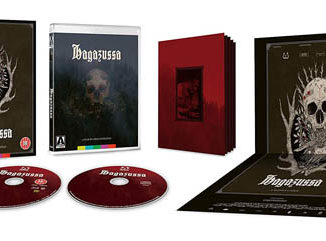
Be the first to comment